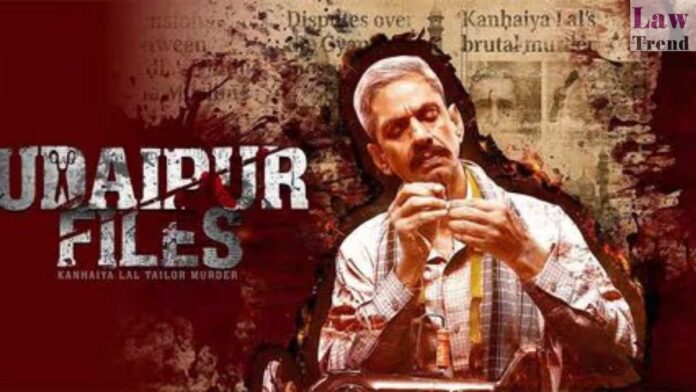The Supreme Court of India on Wednesday refused to interfere with the Delhi High Court’s order staying the release of the controversial film ‘Udaipur Files,’ which is based on the 2022 murder of tailor Kanhaiya Lal. A bench comprising Justice Surya Kant and Justice Joymalya Bagchi directed the Central Government to exercise its revisional jurisdiction under the Cinematograph Act, 1952, and take a decision on the matter expeditiously.
The Court has posted the matter for further consideration on July 21, 2025, and expects a decision from the Centre’s committee by then.
Background of the Case
The film, which dramatizes the brutal murder of Udaipur-based tailor Kanhaiya Lal, was scheduled for release on July 11, 2025. The release was challenged in the Delhi High Court through a batch of petitions, including one filed by the Jamiat Ulama-e-Hind, arguing that the film is communally divisive and could disrupt public order.
Initially, on July 9, a vacation bench of the Supreme Court had declined an urgent hearing on a separate plea by Mohammed Javed, an accused in the murder trial, who sought a stay on the grounds that the film would prejudice his right to a fair trial. The bench had orally remarked, “Let the film be released.”
However, on July 10, the Delhi High Court, after a special screening was arranged for the petitioners’ counsel, stayed the film’s release. The High Court directed the petitioners to approach the Central Government with their objections, invoking the government’s revisional powers under Section 6 of the Cinematograph Act. The producers of the film, Jani Firefox Media Pvt. Ltd., subsequently filed an appeal in the Supreme Court against the High Court’s stay order.
Arguments of the Parties
Appearing for the filmmakers, Senior Advocate Gaurav Bhatia argued that the High Court’s order was an infringement of their fundamental right to freedom of speech and expression. He submitted that the film had already been granted a certificate by the Central Board of Film Certification (CBFC) after 55 cuts. Mr. Bhatia highlighted the significant financial losses incurred by the producers, who had booked theatres and started advance ticket sales before the last-minute stay.
Representing the original petitioners before the High Court, Senior Advocate Kapil Sibal contended that the film was “cinematic vandalism” and aimed at vilifying an entire community. Having watched the film in the screening, Mr. Sibal submitted, “I was shaken in every sense of the word. If any judge were to see it, they will be shocked. Its complete theme is of hate against the community… It is something that generates violence.”
Senior Advocate Menaka Guruswamy, appearing for the accused Mohammed Javed, argued that irresponsible free speech could not be used to undermine the right to a fair trial and lower the moral authority of the judiciary.
Court’s Analysis and Observations
The Supreme Court bench noted that the Delhi High Court had not commented on the merits of the film’s content but had rightly relegated the petitioners to the statutory remedy available under the Cinematograph Act.
The bench observed that the “balance of convenience” lay with the parties opposing the movie’s release. Justice Surya Kant remarked, “If the movie is released.. there will be irreparable damage. If it is not, then you can be compensated.” The bench further opined that any controversy often works in a film’s favour.
While expressing confidence in the objectivity of the judiciary, Justice Kant also stated, “Our judicial officers are not school-going children that they can be swayed by movie dialogues… absolutely confident about their objectivity… sense of detachment.”
The Court emphasized that the Central Government is empowered to take interim measures, including suspending a film’s exhibition, pending its review. It permitted the accused in the Kanhaiya Lal murder case to also be represented before the committee constituted by the Centre.
Decision of the Court
The Supreme Court declined to lift the stay imposed by the Delhi High Court. It ordered the Central Government’s committee to examine the objections to the film and take a decision “immediately without any loss of time.”
The Court ordered, “We expect that the committee will decide the revision plea immediately without any loss of time. Post the matter for further consideration on July 21.”
The stay on the release of ‘Udaipur Files’ will continue at least until the next hearing, pending the Central Government’s decision.




